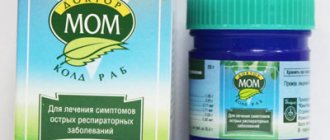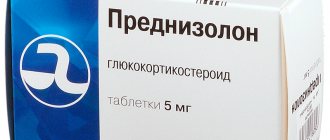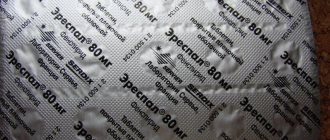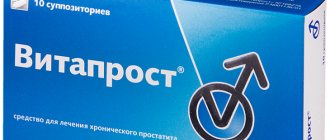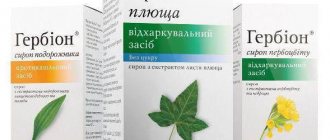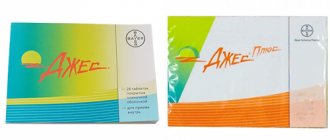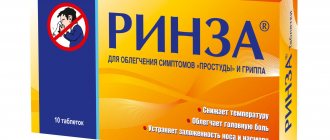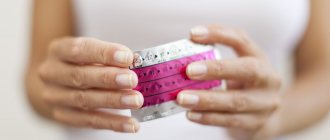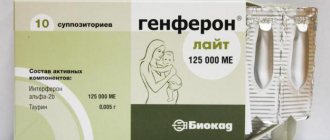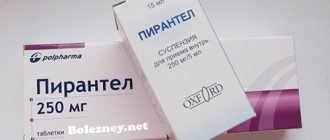The drug Pertussin is one of the oldest pharmaceutical methods for treating cough. It is inexpensive, tastes good, and is loved by both children and adults. Many people take medicine at the first sign of illness. But in reality, you need to take Pertussin syrup for which cough, dry or wet?
Composition of the drug
"Pertussin" is a drug of combined action that has a powerful expectorant effect. It is classified as a herbal medicine. The drug contains thyme extract (creeping thyme) and potassium bromide. The herb produces special substances that dilute mucus accumulated in the upper respiratory tract.
Thyme contains the following beneficial substances: essential oils, bitterness, flavonoids, carotene, thymol.
The main active ingredient of the syrup:
- disinfects and kills pathogenic microorganisms;
- has an expectorant effect, which allows you to get rid of sputum in the bronchi;
- reduces pain, which is especially important when the cough is dry and difficult to breathe;
- relieves spasms of the bronchi and lungs, restoring normal breathing.
Potassium bromide affects brain cells. The cough center is located in one of the parts of the brain. Excessive agitation leads to prolonged coughing attacks. At this time, phlegm cannot be coughed out, so the healing process is delayed. The drug suppresses the activity of this department and improves health. Potassium bromide has a sedative effect on the nervous system and causes an antitussive effect.
According to reviews, “Pertussin” is produced only in the form of syrup. It is a dark viscous liquid.
What cough does Pertussin help with?
Before you figure out what kind of cough Pertussin helps with, you need to become more familiar with its action. The drug is a combination drug consisting of both synthetic and natural components. It includes:
- thyme extract;
- ginseng extract;
- potassium bromide;
- sugar syrup;
- ethanol.
Refers to expectorant drugs. Thyme and ginseng make it easier to remove mucus by actively liquefying it. Potassium bromide has a calming effect on the mucous membrane, relieving spasms and reducing the frequency of severe coughing attacks. The drug helps lift mucus from the lower parts of the lungs and bronchi, concentrates it in the upper parts of the respiratory tract. This allows you to protect the patient from the occurrence of serious complications and quickly remove all the debris accumulated in the bronchi.
And yet, what kind of cough can Pertussin be taken for? The drug is a universal remedy that is relevant for the treatment of both dry and wet cough . The components included in its composition effectively act on any type of irritant. This is Pertussin's great advantage. Not every cough suppressant can simultaneously effectively combat the problem of both dry and wet cough.
When should you take the drug?
Fragrant and pleasant syrup is present in every home. Some people start taking the remedy at the first sign of cough. According to reviews, the instructions for use of Pertussin allow it to be used if sputum discharge is difficult. The drug is included in complex therapy for the following diseases:
- Acute respiratory diseases (ARI, ARVI).
- Flu.
- Bronchitis.
- Tracheitis.
- Pneumonia.
- Whooping cough.
According to reviews of its use, “Pertussin” (syrup) allows you to achieve the greatest effect if taken in combination with other medications, but it is not used as a single drug for the treatment of serious diseases. Reducing symptoms will not lead to complete recovery. Depending on the stage and course of the disease, specialists prescribe antibiotics, antivirals, analgesics and other medications.
Pertussin syrup, instructions for use
Pertussin syrup, instructions for use:
- Prescribed for the treatment of pathologies of the respiratory system, accompanied by a dry or wet cough. Actively used for bronchitis, pneumonia, asthma, laryngitis, tracheitis, whooping cough. Used in complex therapy of acute respiratory viral infections and influenza. It can also be prescribed for allergic reactions to external irritants, which are accompanied by manifestations of respiratory spasms and cough.
- Like any medication, it has contraindications. It should not be taken in the following cases:
- for liver diseases;
- for violations of the kidneys;
- with manifestations of epileptic seizures;
- with atherosclerosis;
- with hypotension (low blood pressure);
- with anemia, anemia;
- for problems with glucose absorption;
- in case of individual immunity of the body to one or more components of the composition;
- during pregnancy;
- during the lactation period.
There are also age restrictions. Medicinal syrup should not be given to children under three years of age.
Prescribed with caution to patients with diabetes. The composition includes sugar syrup with a high content of sucrose.
- Side effects may occur during treatment. They are manifested by the following symptoms:
- indigestion;
- heartburn;
- nausea;
- manifestation of allergies in the form of itching, urticaria, swelling;
- the appearance of acne on the skin;
- runny nose;
- conjunctivitis;
- lack of appetite, up to the onset of anorexia;
- depression, apathy;
- decreased sexual desire;
- lack of coordination;
- disorientation.
Having studied the instructions for use in detail, another side of Pertussin is revealed. It has a number of contraindications and can cause many unpleasant side effects. Therefore, despite the fact that the syrup is sold without a prescription, it is recommended to purchase it only after consultation with a specialist!
For what types of cough should the drug be used?
Depending on the characteristics of the cough, it is divided into:
- to productive, in which sputum is produced:
- unproductive when no secretion is formed.
A dry cough does not help alleviate the patient's condition, so it must be treated. If this is not done, it will lead to various complications.
If you have a productive cough, taking the syrup will help remove phlegm. For diseases accompanied by prolonged attacks leading to injury to the mucous membranes, the drug will reduce the cough reflex that occurs.
With a dry cough, there is no release of mucus from the respiratory tract. Analyzing the action of “Pertussin”, we can say that in this case it is completely ineffective. It is best to use other drugs that can help in this situation.
Indications for use
The syrup should be drunk in the first days of illness, when it is difficult and painful for the baby to cough. The medicine thins the mucus, and significant relief is observed on the second or third day.
If the disease begins aggressively, with high fever, shortness of breath, and an unproductive cough, it is important to use more serious medications. The child should be shown to a doctor, and he will prescribe medicine according to the diagnosis and general condition.
What diseases will Pertussin help with? The instructions indicate that the syrup can be given to children with the following diseases:
- bronchitis;
- laryngitis;
- acute respiratory infections;
- tracheitis;
- whooping cough (we recommend reading: how and how to treat whooping cough in children?);
- cystic fibrosis;
- tuberculosis.
“Pertussin” has a dark chocolate color, viscous consistency and a pronounced herbal aroma. It refers to drugs for symptomatic treatment and does not affect the cause of the disease.
Who is allowed to take the drug and how?
According to the instructions and reviews, Pertussin is taken orally. The correct dosage is determined by the doctor. For adults, the drug is prescribed in the following dosage. You need to drink 20 ml three times a day. The course of therapy ranges from 10 to 14 days. Before repeated treatment, you should consult a doctor.
It is necessary to take the drug in accordance with the dosage to avoid negative consequences.
Currently, nebulizers are widely used to treat ENT diseases. Thanks to them, the medicine is sprayed. Using such a device, you don’t have to worry about burning the mucous membrane, and the drug is well absorbed and easily inhaled. There are many solutions for nebulizers, therefore, according to reviews, Pertussin is also used for this procedure.
A solution for inhalation is prepared by mixing the drug with saline solution:
- For children over 12 years of age and adults, dilute 1 ml of syrup with 1 ml of saline solution.
- For children under 12 years of age, 1 ml of the product is mixed with 2 ml of saline solution.
For such a procedure you will need 4 ml of solution. It is carried out three times a day. According to reviews, “Pertussin” (syrup) is not recommended for use in children under 3 years of age.
Despite the gentle effect of the procedure, it is necessary to strictly adhere to the age restrictions of the product.
What kind of cough should children take Pertussin for?
According to the instructions for use, the drug can be taken by children from the age of three . However, in some cases, pediatricians prescribe the minimum dosage for sick children from 2 years of age. But such treatment must be carried out under the supervision of doctors and strict adherence to the dosage!
The maximum dosage of the drug for children is half a teaspoon three times a day. Older children are allowed to give a teaspoon three times a day. The duration of the course of treatment is no more than 2 weeks.
What kind of cough should children take Pertussin for? As in adults, the drug is prescribed to treat any type of cough .
"Pertussin" for children
Modern drugs are available in several forms, but there is no baby syrup. According to reviews, the instructions for use of “Pertussin” for children allow children over 3 years of age to take the product. The dosage of syrup is determined by age:
- Children aged 3 to 6 years are prescribed 2.5 ml of syrup 2 times a day. This amount of the drug must be dissolved in 20 ml of water.
- Children from 6-12 years old take 5 ml three times a day.
- Over 12 years of age, 10 ml is prescribed 3 times a day.
The duration of treatment is determined by the pediatrician, but usually it is 14 days. When taking the drug, you must follow the dosage.
Contraindications and overdose
"Pertussin" includes alcohol, so it is prescribed to children over three years of age. For children who have not reached this age threshold, pediatricians select drugs without alcohol, prescribing Pertussin in extreme cases. The medicine is contraindicated in the following situations:
- sensitivity to syrup components;
- epilepsy;
- anemia;
- kidney pathologies;
- traumatic brain injuries;
- heart failure;
- disturbance of carbohydrate metabolism.
Sweet syrup for diabetes mellitus is prescribed with caution, after a thorough risk assessment. In 5 ml. syrup contains 0.32 bread units. Its side effects can be expressed as allergic reactions (swelling, itching, urticaria) to plant components. Some children also complain of heartburn and nausea.
Cases of drug overdose are rare and are possible if the child gets to the bottle on his own and drinks the sweet syrup. To prevent this from happening, the bottle should be stored in a place where the baby cannot take it.
READ ALSO: How can a child drink licorice root syrup when he has a cough?
In case of an overdose, symptoms of alcohol intoxication and bromine poisoning develop, in particular:
- excitability;
- impaired coordination of movements;
- conjunctivitis, runny nose, lacrimation;
- heartburn, abdominal pain, nausea.
If symptoms of intoxication are severe, it is advisable to call an ambulance. You should try to rinse the stomach yourself (if you have experience), give activated carbon (up to 5 tablets), drink it with water and carefully monitor your well-being for three days (see also: activated carbon for children over 3 years old). After a large dose has been taken once, Pertussin is not given to the child for a year.
"Pertussin" during pregnancy
Quite often, women have questions about whether it is possible to take the drug while pregnant. Unlike similar cough syrups, it should not be used by women during pregnancy and lactation. Substances that make up the drug may cause:
- increase in blood pressure;
- increased uterine tone;
- various disorders in fetal development.
The last symptom may occur due to the ethyl alcohol contained in the syrup. When feeding, the presence of this component in breast milk can affect not only its quality, but also the health of the baby. Therefore, a woman should consult a doctor who will prescribe a safer drug.
Pertussin syrup - contraindications
Although this drug is effective in suppressing the cough reflex, it is not recommended for use by everyone. Since Pertussin syrup-medicine contains bromide, it should not be given to two-year-old children, because this component will provoke bromide in children. However, this is not the only contraindication for use.
The drug Pertussin is not prescribed for the following conditions:
- anemia;
- hypotension;
- epilepsy;
- heart failure;
- hypersensitivity to one of the components present in the drug;
- diabetes mellitus;
- alcoholism;
- traumatic brain injury;
- liver dysfunction.
Many women of childbearing age are interested in whether pregnant women can take Pertussin. Experts agree that this drug is unsafe during pregnancy and breastfeeding.
This syrup can cause:
- increased uterine tone;
- a sharp rise in blood pressure in a woman;
- violations in the development of the baby.
If necessary, the doctor can replace Pertussin with another drug that is more effective or safer for the patient. There are no medications with identical composition. For this reason, when choosing a drug, they are guided by the characteristics of the disease and the body’s reaction to one or another component of the drug.
More often Pertussin is replaced with the following medications:
- Overslept;
- Linkas;
- Travisilom;
- Eucabalom;
- Gerbion;
- Mukaltin.
Contraindications of the drug
According to reviews of the application, "Pertussin" can be prescribed as a medicine for adults and children. But due to its composition, the drug has a number of contraindications.
It should be taken under the supervision of a doctor:
- with pathology of the liver and kidneys;
- during pregnancy and lactation;
- with heart failure;
- for epilepsy;
- when the child is under 3 years of age;
- with individual intolerance;
- at low pressure;
- for head injuries.
According to reviews and instructions for use, Pertussin syrup is not recommended for use if you are obese, have metabolic disorders, or have diabetes because of the large amount of sugars in it. It is forbidden to use the product for alcoholism, epilepsy and head injuries, because it contains alcohol. Therefore, the drug is not prescribed to young children.
People whose profession involves working at machines and driving vehicles should avoid taking the drug.
When should you not take Pertussin for cough?
There are a number of contraindications for the use of Pertussin:
- increased sensitivity or individual intolerance to the components of the drug (if after using Pertussin syrup a rash, fever suddenly appears, or your health suddenly worsens, then you must immediately stop taking it, drink enterosorbent and seek help from a specialist);
- liver diseases;
- brain lesions of various origins;
- epilepsy;
- traumatic brain injuries;
- intolerance or malabsorption of sugars (glucose, galactose);
- lack of sucrase/isomaltase;
- stage of decompensation in chronic heart failure;
- bearing a child;
- lactation;
- age up to three years.
Useful information: Prospan cough syrup: instructions, features of use in children.
Comparison with the analogue Gedelix Children over 3 years of age should use Pertussin carefully, which is due to the presence of ethyl alcohol in the composition. People suffering from diabetes should also be careful about monitoring their blood glucose during treatment with syrup, as it contains a fairly high amount of sugar. In such cases, it is better to give preference to drugs that do not contain sugar or consult a doctor.
It must be remembered that Pertussin contains from 8 to 11% ethanol. This should be taken into account when driving vehicles, performing activities that require high concentration of attention and speed of response (for example, working as an operator, dispatcher).
Possible adverse reactions
When taking the drug, the patient may experience undesirable consequences. According to reviews, “Pertussin” for cough can cause the following adverse reactions:
- You may experience lethargy, general slowness or drowsiness.
- The drug can lead to a deterioration in appetite, which occurs rarely and is transitory.
- If redness or itching occurs on the body, it is best to stop taking the syrup. If the manifestations are significant, then you need to take antihistamines and seek help from a doctor.
- When heartburn occurs, you need to use a medicine that reduces unpleasant symptoms.
If the drug is taken correctly, an overdose cannot occur. Most often it appears in children when parents exceed the established norm. If an overdose occurs, then it is urgent to drink enterosorbent. If such a condition occurs in a child, it should be shown to a doctor.
What is Pertussin syrup
A medicinal product of mixed origin, containing both plant and chemically synthesized substances - this is what Pertussin syrup is. The combined action of the different components of the medicine helps to quickly and effectively cope with a cough that constantly torments a child or adult. Children take Pertussin syrup well and do not refuse it because the medicine is very sweet. Despite the presence of artificially synthesized elements, Pertussin syrup is classified as herbal medicine.
Reviews from doctors
"Pertussin", according to doctors, is a trustworthy drug, but nowadays it is rarely used due to the huge number of similar drugs.
Experts note the effectiveness of using it to treat not only adults, but also children. If the correct dosage and duration of use are observed, Pertussin helps get rid of the symptoms of the disease and speeds up recovery.
Doctors note the effective effect of the drug on the patient’s health when it is used as an active substance for inhalation.
What does Pertussin contain: thyme or thyme?
As active ingredients, Pertussin syrup contains:
- liquid thyme extract (12 g);
- potassium bromide (1 g).
Excipients in the drug are represented by the following components:
— ethanol 95% (4 g);
— sugar syrup 64% (82 g);
- purified water (1g).
Pertussin is available in the form of syrup, which is a dark brown liquid of thick consistency with a spicy herbal odor. There are bottles of 50, 100 and 125 milliliters.
Please note that Pertussin does not exist in tablets. But there are tablets called Pectusin, which have an antitussive effect and have a completely different composition. Therefore, you need to be very careful when buying the drug at the pharmacy.
In some articles on the Internet you can read that Pertussin does not contain common thyme extract, but creeping thyme. The fact is that these are different names for the same plant from the Lamiaceae family. Its extract contains essential oil, the main component of which is thymol (about 30%). It is this substance that has the ability to increase the amount of secretion that is formed by the bronchial mucosa, reduce its viscosity and improve sputum discharge.
Patient reviews
For many patients, “Pertussin” has become a cough medicine, which in its performance is no different from expensive drugs. They take it according to the instructions and after a few days they feel an improvement. Patients have known the drug for a long time, so they completely trust its properties.
According to reviews and instructions, “Pertussin” can be used for children no earlier than after they are 3 years old. Many parents note the effectiveness of the drug, but sometimes after using it, the child develops a rash and itching on the body.
The second group of mothers are very pleased with the effectiveness of Pertussin, but be sure to take the correct dose of the drug when taking it due to the presence of alcohol in its composition. There is also a pleasant taste of the syrup, which is liked by young patients.
"Pertussin" is a drug that has positive properties in the treatment of symptomatic cough in children and adults. Patients like the pleasant taste of the syrup, its effectiveness and low price. But despite the positive qualities of the drug, it has side reactions and contraindications. Before taking it, you should consult a specialist on the correct dosage and duration of use, which is especially true for young patients. After all, the product contains components that do not always have a beneficial effect on the body.
How to take Pectusin tablets summary
Pharmacological group
A combined preparation of plant origin with a local irritant, distracting, anti-inflammatory and antitussive effect.
Release form
The drug Pectusin is available in the form of lozenges in contour cells of 10 tablets.
pharmachologic effect
Included in Pectusin, menthol and eucalyptus oil have a local irritating, distracting, anti-inflammatory and antitussive effect.
Menthol - has a local reflex-distracting effect on the mucous membranes of the upper respiratory tract, which reduces irritation of cough receptors, as well as a mild anesthetic (pain-relieving) effect.
Eucalyptus oil has an anti-inflammatory and moderate antiseptic effect.
Indications for use
The use of Pectusin in children and adults is indicated in complex therapy for inflammatory diseases of the upper respiratory tract, accompanied by cough, tickling, irritation of the mucous membranes, pain and discomfort:
- Laryngitis
- Pharyngitis
- Tracheitis
- Tracheobronchitis
- acute respiratory infections
- Rhinitis
- Sinusitis
Use for inflammatory diseases of the lower respiratory tract (dry cough with bronchitis, COPD, etc.) is ineffective, which is due to the limited contact area of the active components of Pectusin when resolving tablets.
For which cough should Pectusin be used?
The use of Pectusin is advisable and effective only in the presence of a sore or dry cough caused by an inflammatory process in the upper respiratory tract. This is due to the local, rather than systemic, effect of the drug.
Use during pregnancy and during breastfeeding
The use of the drug Pectusin during pregnancy and lactation is not contraindicated, but it must be used with caution and under the supervision of a physician.
Use in young children
The age limit for children is not due to the side effects of the active components of Pectusin (menthol, eucalyptus oil), but to the form of release and the taste of the tablets.
But if the pediatrician considers it necessary to prescribe, and the child enjoys absorbing Pectusin, then it can be safely used in young children, despite the contraindications in the instructions for use.
Otherwise, it is better to choose a drug with a similar effect, but in the form of syrup or drops.
Side effects
The only side effects of Pectusin were allergic reactions: skin itching, skin rash, urticaria, angioedema, etc.
How to take: method, doses and frequency
The Pectusin tablet must be kept in the mouth until completely dissolved. Do not chew.
Dosage:
- Adults and children over 14 years of age, dissolve 1 tablet 3-4 times a day
- Children aged 8-14 years take 1/2 tablet 3-4 times a day
In case of severe discomfort (stingling, dry cough), it can be used more often - up to 6-8 times a day.
Duration of treatment: 3-5 days.
Composition and release forms
Pertussin has a pleasant, sweet taste, it has a characteristic plant smell, and the color of the syrup is dark brown. Sold in dark glass bottles of 50 and 100 grams . In order to accurately measure the syrup dosage, the package contains a measuring spoon. A 100-gram bottle contains 1 gram of potassium bromide, 12 grams of liquid extract of creeping thyme, an auxiliary substance (ethyl alcohol 80% and sugar syrup).
Also, in addition to Pertussin in the form of a syrup, there is Pertussin H in the form of a solution . They have almost identical effects, differing slightly in composition. Ethyl alcohol in Pertussin Ch solution is 95%, in contrast to syrup, in which it is 80%. They do not differ in the content of other components.
Analogs
The syrup is a unique combination of components, so there are no drugs on sale that are similar in composition to Pertussin. There are many synonymous drugs that promote sputum discharge. These include:
- Licorice root extract;
- Mukaltin;
- Amtersol;
- Dr. Theiss;
- Gerbion;
- Linkus Lore;
- Cashnol;
- Ascoril;
- Pectusin;
- Stoptussin;
- Phytopectol;
- Sudafed;
- Rinicold Broncho;
- Eucatol;
- Collections of medicinal herbs.
Pectusin or Pertussin – which is better?
Both medications are intended to facilitate the removal of mucus from the bronchi, but Pectusin is produced only in tablets that contain menthol and eucalyptus extract. It is impossible to say which drug works better, since each person has his own sensitivity to the components of the drugs. Pertussin is contraindicated for people with diabetes, but Pectussin tablets can be taken. If a person has allergic reactions to menthol or eucalyptus, then pertussin syrup will help alleviate the condition of diseases of the ENT organs.
Pectusin has fewer side effects and can be taken by pregnant women, but it is contraindicated for children under 7 years of age. The absence of bromine salts makes Pectusin a safer drug than Pertussin, however, the final decision on the use of this or that medication should be made by the attending physician; you should not try to cure yourself of ailments affecting the upper respiratory tract on your own.
How to take: special instructions
The syrup is prescribed in combination with other medications aimed at eliminating the cause of the disease.
It is strongly not recommended to take it together with cough reflex blockers. If this instruction is violated, the patient experiences stagnation of sputum in the body and the development of inflammation in the bronchi.
Mucus-thinning drugs and antitussives are used alternately : a cough suppressant is taken at night, and an expectorant medication is taken during the day.
Pertussin should be taken with caution if the patient suffers from diabetes , since the medicine contains sucrose.
Young children need to dilute the syrup with water due to the ethanol or ethyl alcohol content in the syrup.
Overdose and side effects
You should carefully monitor the child’s well-being while taking the medicine to avoid unwanted reactions of the body.
How to understand that an overdose has occurred? The patient experiences severe malaise, weakness, periods of bradycardia (slow heart rate), ataxia (impaired coordination), skin rash, gastroenterocolitis (inflammation of the large and small intestines and stomach), rhinitis (inflammation of the nasal mucosa), conjunctivitis.
As soon as the child shows the first signs of an overdose, the drug should be completely stopped . You can start a second course of treatment with Pertussin only after consulting a doctor.
The patient experiences discomfort if an allergic reaction occurs to any component of the product. The patient begins to experience skin itching, unexplained redness and rashes .
Increased sensitivity is the cause of severe difficulty breathing and decreased blood pressure .
As soon as signs unusual for the child’s body appear, you should inform the doctor, who will decide on the possibility of further therapy using Pertussin.
If you want to find out how to take and how much Nurofen for children in syrup costs, read our publication.
Instructions for using Erespal syrup for children are discussed in this article.
You can find out about the indications, contraindications, reviews and price of Lazolvan children's syrup here.
Interaction with other drugs
No studies have been conducted on the interaction of Pectusin with other medications.
Pectusin is a combination drug that has an antiseptic, anti-inflammatory and mild analgesic effect. The active ingredients of this medication are eucalyptus oil and menthol. In addition, the composition contains sodium salt, crystalline sugar, calcium stearate and talc. The therapeutic effect of using the drug is explained by its irritating effect on peripheral nerve endings.
Pectusin is mainly produced in tablets, which are packaged in a paper or plastic blister. The tablets are white, without any inclusions. These pills are designed to be absorbed in the mouth. When the tablets enter the mouth, a feeling of cold is felt, which is explained by the special effect of the components included in the drug.
The main component of Pectusin is eucalyptus oil, so a pregnant woman must first make sure that she is not allergic to this substance.
Against the background of the variety of expensive cough medicines, a myth was born that a good drug cannot be cheap. However, in some cases this is truly a myth. Let's try to find out how much cough medicine costs.
The pharmaceutical industry continues to produce effective cough medicines at a very affordable price. Today, a pack of 10 tablets of pectusin, proven by time and several generations of patients, can be bought for only rubles. Considering that you need to take 1 tablet 3 times a day, the package will last for three days. Thus, one day of treatment costs only rubles. And for a week-long course you will have to spend less than 100 rubles.
Another proven cough remedy is pertussin. A 100 ml bottle of syrup costs less than a ruble. It is enough to treat an adult patient for about two and a half days. Taking into account the fact that only one tbsp is needed per dose. l. drug, and it is drunk three times a day, then a weekly course will also cost less than 100 rubles.
Let's compare with prices for other medicines:
- Sinekod, syrup, volume 100 ml, will cost more than 200 rubles;
- Linkas, syrup, 90 ml, costs 160 rubles;
- Codelac, 10 tablets, price about 130 rubles;
- Codelac, syrup, 100 ml, price about 160 rubles.
Some may object that pertusin or pectusin is not used for coughs; the instructions for use will dispel these objections.
Today, pertussin is not available in tablets. However, you can buy tablets with the similar name pectusin at the pharmacy. These tablets are not taken orally. They should be kept in the mouth until completely absorbed. The instructions for using the medicine to treat children contain conflicting information. Some manufacturers indicate that children under three years of age are a contraindication to the use of pectusin tablets, others increase this age to seven or even eight years.
In any case, tablets should not be given before three years of age, and after three years - only in exceptional cases. This is because menthol and eucalyptus oil can cause laryngospasm or bronchospasm in young children. Many children like the minty and cooling taste of the tablets, but sudden suffocation after taking the tablet can lead to the most severe consequences.
Children over seven years of age should take tablets only in the presence of adults. It is acceptable to give one tablet 2-3 times a day. Treatment is continued for five days. After this, to avoid serious complications, you need to visit a doctor.
Given the ambiguity of the use of pectusin and pertussin for the treatment of cough in children, you can pay attention to medications of similar composition and action.
Pectusin, indications and contraindications
Pectusin cough tablets were developed and released about half a century ago.
The medicine was developed at the Odessa pharmacological association. In 1974, the developers received a medal at the exhibition of national economic achievements for cough tablets. Combination type drug. It contains menthol and oil from eucalyptus leaves. Menthol has a local anesthetic effect, dilates blood vessels, stimulates mucous membrane receptors and has antimicrobial properties. Eucalyptus leaf oil relieves inflammation from the mucous membranes of the respiratory tract. In addition to the two active ingredients, the composition contains sugar, talc and other excipients.
The medicine is used for various diseases that are accompanied by cough:
- with bronchitis;
- with tracheitis;
- for rhinitis.
The drug has virtually no contraindications, except allergic reactions. Currently, the company has mastered the production of a new variety of this medicine. New pectusin is produced with the addition of vitamin C.
Pertussin helps well with dry coughs: it thins mucus and promotes its rapid elimination. Usually prescribed for the following pathological conditions:
- pneumonia (pneumonia);
- bronchitis of any nature;
- whooping cough (a bacterial infection accompanied by paroxysmal spasmodic cough);
- infectious and inflammatory lesions of the airways;
- tracheitis.
Pectusin is also prescribed for pathologies of the respiratory system. In addition, the drug, according to the instructions, is effective in the treatment of rhinitis. It reduces the degree of inflammation and eliminates pain in the nasopharynx.
Sweet cough syrup Pertussin is most often prescribed for dry coughing, to stimulate the discharge of mucus in a number of ailments.
- pneumonia;
- bronchitis;
- tracheitis;
- diseases of the respiratory tract of an infectious-inflammatory nature;
- whooping cough.
Thanks to potassium bromide, which is present in the composition of the product, the patient receiving the syrup has a calming effect, helping to reduce a cough attack during a dream.
When purchasing funds, it is important to study in what cases they should not be used.
Restrictions for Pectussin:
- intolerance to the components of the drug;
- spasmophilia;
- pregnancy and breastfeeding;
- diabetes;
- croup;
- age up to 7 years.
Pertussin is not used if there are:
- liver and kidney diseases;
- arterial hypertension;
- anemia;
- period of pregnancy and lactation;
- age up to 3 years.
When choosing a particular drug, in addition to the active ingredients, it is worth considering what auxiliary components are present in the drug. With less dyes, alcohol, sugar, the benefits of the product will be higher, which is important when treating coughs in children. If you eat right, exercise, and lead a healthy lifestyle, colds can be avoided.
Drug interactions
Since the drug is intended for the best removal of sputum, it is not recommended to drink Pertussin syrup together with medications for dry cough, such as Sinekod, Codelac, Libexin. Taking it together will not provide any relief to the patient’s condition, but will cause congestive inflammation in the bronchi and lungs. You can only combine these medications one by one: during the day, drink Pertussin syrup to get rid of sticky sputum, and at night, take medications that suppress cough reflexes in order to fall asleep normally.
Indications
The main indication for use of the drug Pectusin is cough. The product copes well with wet, productive coughs and with dry ones, when phlegm does not come out at all. The drug has a therapeutic effect for the following diseases:
- Chronical bronchitis;
- acute bronchitis;
- bronchial asthma;
- inflammatory processes of the nasopharynx;
- pneumonia;
- acute viral respiratory diseases;
- laryngitis.
You should consult your doctor regarding the use and duration of treatment, as Pectusin has some contraindications.
Drug analogues
One of the well-known analogues of Pectusin is Pertussin syrup. It contains thyme and potassium bromide. Pertusin acts in a similar way - it soothes paroxysmal coughs and has an expectorant effect.
Bronchipret is produced abroad and is used as an anti-inflammatory and expectorant. The drug contains thyme in the form of essential oil, due to which the medicine has an antifungal and antibacterial effect. It has a thinning effect on mucus accumulated in the bronchi and promotes its removal from the respiratory tract.
Tussamag is based on herbal ingredients and has a minimum of contraindications. Can be used in children under one year of age. Effective for chronic or acute bronchitis, laryngitis, tracheitis and similar diseases accompanied by cough.
Thyme herb extract is included in Bronchicum S . The product reduces inflammation and improves the process of mucus removal. Contraindicated in chronic and acute heart diseases and liver disorders.
Alteyka is widely used for whooping cough, tracheitis, bronchitis, pneumonia and other inflammatory and infectious diseases of the respiratory system. Ledum in syrup is known for its expectorant and antitussive properties and is used for viral respiratory infections.
Broncholex is prescribed for colds of an inflammatory nature. Its main active ingredient is ivy leaf extract. Can be taken by children and adults.
Gedelix is included in complex therapy for laryngitis, bronchitis, and pneumonia. Significantly facilitates the discharge of sputum, has an enveloping and expectorant effect.
Related video: Is it possible to take cough syrup and cough tablets at the same time?
Side effects and contraindications
Treatment with Pectusin is well tolerated by patients of any age. A negative reaction to the drug may occur if the doctor’s recommendations are not followed or contraindications are ignored. An adverse reaction of the body has the following symptoms:
- nausea, retching, sometimes vomiting;
- feeling of heartburn;
- feeling unwell, weakness;
- drowsiness;
- allergic manifestations on the skin in the form of small rashes.
The appearance of any of these signs requires stopping treatment with this drug and seeking help from a doctor. A different dosage or another similar drug may be prescribed. To alleviate the condition if an adverse reaction occurs, it is enough to take the sorbent and drink more liquid.
Contraindications
Medicinal syrup from Pectusin has several contraindications. It should not be taken if:
- individual characteristics of the body, when there is intolerance to some component of the syrup;
- heart failure in chronic or acute form;
- pregnancy and during breastfeeding.
Pectusin should not be taken during pregnancy
Contraindications
The list of contraindications for the herbal medicine is extensive. It should not be taken in the following cases:
- at the last stage of heart failure;
- at any stage of pregnancy and while breastfeeding;
- kidney and liver diseases;
- diabetes mellitus and intolerance to sucrose and fructose;
- alcoholism;
- anemia;
- history of epilepsy;
- low upper blood pressure;
- allergies to any of the components of the herbal medicine;
- after TBI;
- in children up to three years of age.
Interaction
Pectusin is prescribed by doctors to enhance the removal of mucus from the respiratory tract during colds in children and adults. In this regard, it is not recommended to combine the product with drugs intended for the treatment of dry cough. Such a union can lead to stagnation of sputum and the development of an inflammatory process in the lungs and bronchi.
These medications can only be combined with the permission of a specialist. This must be done in strict order. For example, syrup is taken in the first half of the day, and at night an antitussive to suppress the cough reflex and normal sleep.
When is it prescribed?
The drug helps cope with acute respiratory diseases, bronchitis, whooping cough. An ENT doctor prescribes Pertussin as part of complex therapy.
For what cough is Pertussin syrup prescribed for children:
- for ARVI and influenza of various etiologies;
- tracheitis;
- chronic or acute bronchitis;
- pharyngitis, laryngitis;
- pulmonary tuberculosis;
- bronchial asthma.
Indications, contraindications and side effects, the cost of Linex for children can be found in this material.
Our publication will tell you how to give Smecta to an infant.
Does activated charcoal help with vomiting in a child? Find the answer to the question in this article.
